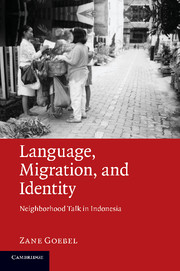Book contents
- Frontmatter
- Contents
- Figures
- Diagrams
- Maps
- Tables
- Extracts
- Preface
- Conventions
- 1 Introduction
- 2 Long-term Processes of Enregisterment
- 3 Enregistering Local Practices and Local Spaces
- 4 Linguistic Signs, Alternation, Crossing, and Adequation
- 5 Women, Narratives, Identity, and Expectations in Ward 8
- 6 Learning to Become a Good Ward Member
- 7 Emerging Identities in a Monthly Ward 8 Male Meeting
- 8 Chineseness as Deviance
- 9 Language Ideologies and Practice in Ward 5
- 10 Conclusions
- Notes
- References
- Index
2 - Long-term Processes of Enregisterment
Published online by Cambridge University Press: 04 August 2010
- Frontmatter
- Contents
- Figures
- Diagrams
- Maps
- Tables
- Extracts
- Preface
- Conventions
- 1 Introduction
- 2 Long-term Processes of Enregisterment
- 3 Enregistering Local Practices and Local Spaces
- 4 Linguistic Signs, Alternation, Crossing, and Adequation
- 5 Women, Narratives, Identity, and Expectations in Ward 8
- 6 Learning to Become a Good Ward Member
- 7 Emerging Identities in a Monthly Ward 8 Male Meeting
- 8 Chineseness as Deviance
- 9 Language Ideologies and Practice in Ward 5
- 10 Conclusions
- Notes
- References
- Index
Summary
Introduction
Within the humanities and social sciences the popular mass media, schooling, census bureaus and other institutions have been described as sites where stereotypes about language–identity relationships are developed or reproduced (e.g. Bourdieu & Passeron, 1977; Bourdieu, 2006 [1998]; Appadurai, 1996; Collins et al., 2000; Hall, 2006 [1980]; Inoue, 2006; Miller, 2004; Meek, 2006). With recourse to work on semiotic registers (SRs) and processes of social identification, this chapter traces the development of such relationships in Indonesia. I do this by looking at how institutional representations of language use formulate SRs linking language use to performable social categories of personhood and relationship. As such, this chapter can be seen as providing an introduction to the broader context of language use in Indonesia. In particular, it provides an introduction to some of the widely circulating signs and the SRs of which they are a part.
More specifically, Section 2.1 draws upon work on the enregisterment of SRs (Agha, 2007) and processes of social identification (Wortham, 2006) to provide a theoretical base that is applicable to this and subsequent chapters. This discussion points to a need to see concepts such as identity and language as not only difficult to separate, but also best viewed as processes with no end point (e.g. Rampton, 1995b; Garrett & Baquedano-Lopez, 2002). Section 2.2 traces one aspect of the enregisterment process, namely the representation of language–ethnicity links in political and public discourses from the late colonial period until the end of the New Order government in 1998.
Information
- Type
- Chapter
- Information
- Language, Migration, and IdentityNeighborhood Talk in Indonesia, pp. 12 - 41Publisher: Cambridge University PressPrint publication year: 2010
